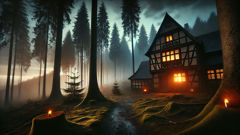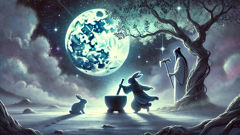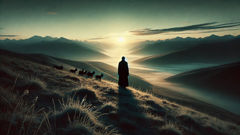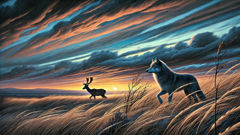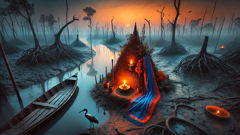Introduction
Mist clung to the ancient boughs of the Black Forest, wrapping its secrets in coils of silver as evening descended on the village of Strohbach. Every cottage, with its steeply pitched roof and timbered walls, seemed to huddle against the vast, shadowy expanse of trees. Stories whispered from hearth to hearth here, and no tale was more chilling, nor more tightly woven into the fabric of life, than that of the changeling—the Wechselbalg. Some said the fair folk left them behind in a moment of moonlit mischief, others believed it a curse for offending the hidden world. For centuries, mothers sang lullabies laced with warnings, children clutched amulets of rowan and iron, and old women scattered salt along thresholds at dusk. Yet, all these protections seemed like brittle twigs against the enduring mystery lurking beyond the treeline. In this place and time, every shadow might conceal a story, and every story might begin with a loss so sharp it left the world forever changed. So it was for the Bauer family, whose laughter once rang bright in the cool, clear air, until the night their youngest vanished. What returned to their cradle was not their beloved Lisbet, but something else—something that watched and waited, eyes gleaming too cold, too knowing for any human child. This is the tale of grief and courage, of the fierce love that drives a mother into the heart of myth, and of the ancient bargains struck between humankind and the wild, wild wood.
A Cradle Emptied: The Bauer Family’s Loss
The Black Forest in late autumn was a tapestry of gold and slate, where the wind carried the scent of damp earth and woodsmoke. The Bauer family lived modestly but contentedly: Hans Bauer, his wife Greta, their two sons Wilhelm and Oskar, and their precious youngest, Lisbet. Hans worked the land with steady hands, Greta spun and dyed cloth as her mother had taught her. At twilight, their cottage brimmed with song and stories—Lisbet’s giggle a bright thread weaving through it all.
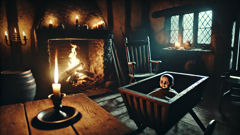
But the forest’s beauty was edged with danger. The Bauer’s home perched just close enough to the wild for comfort, a day’s walk from the next village and hemmed in by old pines. Greta’s mother had warned her, “Never leave the cradle unwatched, not in the dusk—not ever. The fair folk envy what is loved.” Greta had always heeded this advice, but one evening, with bread burning in the oven and Oskar wailing over a stubbed toe, she left Lisbet’s cradle for just a moment. When she returned, the house felt colder—emptied of something vital. Lisbet’s body lay in the cradle, but her skin was ashen, her blue eyes flat and strange. She hardly cried, nor did she seem to hunger. The change was subtle at first—so subtle Greta feared she’d imagined it. But as days turned into weeks, Lisbet’s laughter never returned. Her limbs stiffened oddly; her gaze would fix on corners of the cottage where shadows gathered, unblinking and eerily wise. At night, she’d murmur in a guttural language no one understood. The Bauer boys kept their distance. Hans tried to believe his wife’s fears were born of exhaustion, but even he began to notice the uncanny quiet.
Greta’s heart broke afresh every morning. She remembered old tales: changelings left by capricious elves or fairies, the real child stolen to their hidden world. She sought the counsel of Frau Adler, the midwife and village wise woman, who examined Lisbet with a grave expression. “The Wechselbalg,” Frau Adler whispered, “has the look of her. Do not let it see your sorrow; that only binds it tighter to this world. But do not harm it, for that would endanger your true child.”
Rumors spread. Some villagers offered superstitious remedies—burning salt, cold iron scissors hung above the cradle, bitter herbs. Greta tried them all, desperate for a sign that Lisbet remained within that uncanny shell. But the child only stared, sometimes smiling with a mouth too old for her years. Greta watched the woods for any sign, and Hans kept the door double-bolted at night. Still, Greta dreamed of Lisbet’s soft hands reaching out from a world beyond, and of green-eyed shadows dancing just outside the window. Their once-joyous home became a silent place filled with longing and fear.
The Whispering Woods: Greta’s Quest
Days stretched into weeks, then months. Greta could no longer bear the sight of the changeling’s gaze—Lisbet’s face warped into something unrecognizable. The forest loomed closer each night, drawing her with a compulsion as ancient as the stones beneath her home. She remembered fragments from stories: that a mother’s courage could break the fairy enchantment, or at least force a bargain. One freezing dawn, Greta wrapped herself in her thickest shawl, slipped a pouch of salt into her pocket, and set out beneath a sky bruised with storm.
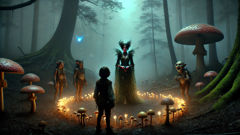
The path into the Black Forest wound between gnarled roots and mossy stones, deeper than she’d ever dared before. The trees stood sentinel, their trunks wide as oxen, bark crusted with lichens in shades of emerald and bone. Light barely penetrated here; shadows stretched into shapes that flickered in the corner of her eye. Greta’s heart beat in her throat as she murmured old prayers and called Lisbet’s name.
A hush fell over the forest as she pressed on, deeper into places even hunters avoided. She followed a trail of tiny footprints in the mud—barely visible, yet unmistakable. They led her to a glen veiled in mist, where a ring of toadstools glowed faintly. In the center stood a woman clothed in leaves and spider silk, eyes green as spring sap. Around her, strange children played, their laughter echoing in unearthly harmonies.
Greta demanded her child’s return. The fairy woman regarded her coolly. “Lisbet is well in our world, for she is beloved by us. But you mortals clutch so tightly to what you love that you suffocate it. The child in your cradle is ours, left as payment for your unguarded love.”
Desperation lent Greta courage. She pleaded, bargained, wept. The fairy woman offered riddles and tasks: to gather a flower that bloomed only at midnight on the highest peak, to outwit a fox with silver fur, to face her own reflection beneath the blackest pond. Greta endured every trial, her love for Lisbet burning brighter with each ordeal. The fairies watched, amused but not unkind. In the end, Greta proved her devotion and humility, and the fairy woman relented—on one condition: Greta must promise never to speak of what she had seen, nor to seek the fair folk’s realm again.
Greta agreed without hesitation. The fairy woman led her back to the toadstool ring, where Lisbet waited—whole, her eyes bright with innocence restored. Greta gathered her daughter in trembling arms, heart aching with relief and love. The forest released them, sunlight breaking through the canopy for the first time in months, as if blessing their return.
Redemption at Dawn: The Changeling’s Farewell
Greta and Lisbet emerged from the forest at dawn, their breath clouding in the crystalline air. The village stirred to life as the sun rose over frost-laced fields. Hans wept when he saw them, and the Bauer home filled once more with warmth and laughter. The changeling-child was gone—vanished without a trace—leaving only a faint imprint in the dust by the hearth.
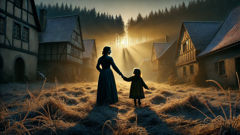
In time, Greta resumed her daily life, but she was changed forever. Lisbet grew strong and happy, never again showing signs of the uncanny darkness that had plagued her. Greta watched over her children more fiercely than ever but with a new understanding. She knew the world was full of mysteries that could never be fully controlled or understood. Sometimes, on misty mornings, she would glimpse strange figures at the forest edge—watching, waiting, or perhaps simply remembering a bargain kept.
Frau Adler visited one afternoon, bringing a loaf of bread and sage advice. “You walked where few dare, Greta. The Wechselbalg is a lesson to us all: love must be fierce but never possessive, for even the purest affection can draw the attention of ancient forces.” Greta nodded, her eyes drifting to Lisbet as she played in the sunlight. The old tales took on new meaning; they weren’t just warnings or superstitions but threads that wove the village together in respect and humility.
The Bauer story spread throughout Strohbach and beyond. Mothers watched their children with renewed vigilance, fathers hung charms above every door, and children sang songs of fairies in the woods—sometimes in awe, sometimes in fear. Yet beneath it all ran a current of hope: if love could bring Lisbet back, perhaps no loss was truly final. The forest remained wild, its secrets undiminished, but it was no longer only a place of dread. It became a realm of possibility—a borderland where sorrow and wonder, loss and redemption, danced together beneath the ancient pines.
Conclusion
The legend of the Wechselbalg lingers in the Black Forest like the last echoes of a distant song. Greta’s journey became more than a tale of loss and recovery; it wove itself into the identity of Strohbach, shaping how its people viewed love, fear, and the mysteries of their world. The forest’s edge remained a place of caution and reverence, its boundaries respected but its beauty appreciated anew. For Greta, every sunset was a reminder: some sorrows can be survived, some bargains honored without regret. Her courage—born of heartbreak and hope—proved that a mother’s love could traverse even the oldest, wildest magic. To this day, parents tell their children to honor what they cannot see, to respect the old ways, and to remember that not all lost things are lost forever. The Black Forest stands eternal, its shadows deep as ever, yet its heart holds stories of both terror and redemption. The changeling’s legend endures—not just as a warning, but as a testament to love’s enduring power against even the most mysterious darkness.

